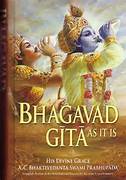Bhagavad Gita among texts that is required reading for Seton Hall freshmen
The urgent need of liberal arts education for Indian youth
New Jersey, October 25th 2013
 Bhagavad Gita is required reading for all freshman at Seton Hall University in New Jersey.
Bhagavad Gita is required reading for all freshman at Seton Hall University in New Jersey.
From the Seton Hall blog & magazine, we see that every freshman is required to take the Journey of Transformation class. In this class, students study transformative journies portrayed in classical Greek, Catholic, Islamic and Hindu texts, as well as mordern novels, auto-biographies, short stories and films. Bhagavad Gita is among the required reading for this course, and so are Plato, The Gospels, Augustine’s Confessions, Dante’s Divine Comedy, and other texts.
The new classes challenge students to ponder serious existential questions: what is real? What is the truth? Is there meaning to suffering? What is love? What is freedom? How does faith relate to reason, science and non-belief?
One of the students, Terence Tay, says about the course: “My major is accounting, so at first I was disappointed because I thought [Journey of Transformations] had nothing to do with my major, but after I took the class, it made me feel I could actually learn for the sake of learning”. (Seton Hall Winter/Spring Magazine 2008).
Reading this, two thoughts come to mind:
- It is amazing that Indian sacred texts are respected around the world in various cultures but not so much inside India. Is the Bhagavad Gita part of required reading in any University in India? I’d like to know.
- Second, Indian education needs to focus more on life skills as opposed to focusing just on career skills.
Seton Hall is a Catholic University, with courses like “Christianity and Culture in Dialogue” as part of their required signature courses. But they are open to exposing their students to a wide variety of cultures and literature. Just reading the description of Journey of Transformations makes me wish that I could have taken such a class in college.
I remember when I was kid, my uncle used to own a copy of Bhagavad Gita by Swami Prabhupada. Our parents used to tell us how great the text is; but the orange covered text sat on the upper shelf, unused and undisturbed for decades. We are so good at talking about our tradition, but not so good when it comes to actually reading and understanding it, leave alone living it.
Indian universities focus so much on teaching engineering and medicine, mathematics, physics, chemistry and biology, that they forget to teach their students to think about life, reality and what it means. They forget to teach their students to ask “Why”; instead they focus only on the “how”. This makes the students blindly accept the Matrix world that they live in, teaching them to measure life in terms of money & climbing some imaginary ladder of success.
We need to tell our students to ponder the great “Why”s – what is life? why do we do the things we do? Why are we unhappy? Without it they just grow up disillusioned & stressed in the matrix world, chasing after things they don’t understand. Ultimately when they are middle aged, jaded, and close to giving up on life, they turn to Indian scriptures. But by then the Indian education has taught them to be skeptical, but not inquiring; rejecting and not accepting. They hit middle age, broken and with no support system. By then, its too late.
What India needs is liberal arts education – teaching subjects & skills that a human being should know to help them live a free, active, happy life. Not career training that makes them gerbils on a wheel, caged animals that are constantly running but going nowhere.






